CHAPTER 3
LIFESTYLE AND IMMUNE SYSTEM
The human body is composed by millions of cells. The liver, the heart, the brain and the kidneys, all are composed of many individual cells. These cells may have different shapes and functions but all of them have five basic needs:
- Oxygen
- Water
- Nutrients
- Waste elimination
- All poisons kept out
Only when those needs are satisfied can the cells live healthy and fulfill their functions. It is the blood that supplies all these needs.

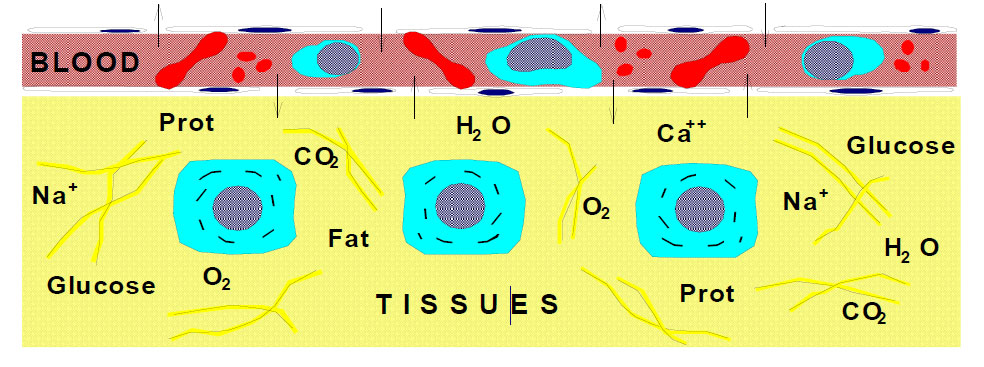
The blood itself is composed by different types of cells with different functions. The red blood cells (erytrocytes) carry oxygen from the lungs to all cells of the body and return the carbon dioxide to the air. The plasma transports the water and the necessary nutrients for the building, repair and production of energy in the cells. In turn, it carries back all metabolic waste products to be eliminated by the respective organs. It is therefore important to supply the best quality food and air in order to have good blood and to keep all harmful substances out of it. Any toxic substances in the blood must be eliminated through the kidneys, liver, lungs, skin and bowl. The white blood cells (leucocytes) compose the defense system, also called the immune system. The platelets are responsible for the coagulation in case of an injury. In reality, the blood is a liquid system. We could say that the blood is the central system of life. This is in agreement with the Bible, because we read that “the life of every creature is its blood.” (Leviticus 17:14)
In order to have good health, we must have good blood; for the blood is the current of life. It repairs waste and nourishes the body. When supplied with the proper food elements and when cleansed and vitalized by contact with pure air, it carries life and vigor to every part of the system. The more perfect the circulation, the better will this work be accomplished.
“At every pulsation of the heart the blood should make its way quickly and easily to all parts of the body. Its circulation should not be hindered by tight clothing or bands, or by insufficient clothing of the extremities. Whatever hinders the circulation forces the blood back to the vital organs, producing congestion. Headache, cough, palpitation of the heart, or indigestion is often the result.” (Ministry of Healing, p. 271)
Cells of the Immune System
Let us now examine some specific white blood cells. The neutrophils or microphages are a kind of soldiers who kill and clean up all kinds of bacteria and foreign substances they find. They engulf small particles and digest them. When many of them die on this process a thick yellowish mass results called pus. The monocytes, also called macrophages, are larger but basically do the same. Sometimes they even join together forming giant cells that are characteristic for some diseases.

The lymphocytes are the smallest white blood cells and live for several years. They carry a kind of “memory” when foreign substances (antigens) enter the body. These are recognized because of their different proteins. There are basically two kinds of lymphocytes, called B-cells and T-cells. Externally they look similar but their specific functions are different. When the B-cells leave the blood vessels and enter into the tissues, they are called plasma cells and produce antibodies against specific foreign substances (humoral immunity). The T-cells receive messages to attack strange cells (cellular immunity). They are then called killer cells. They even recognize cancer cells and destroy them.
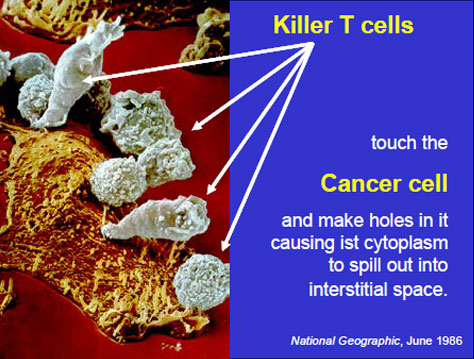
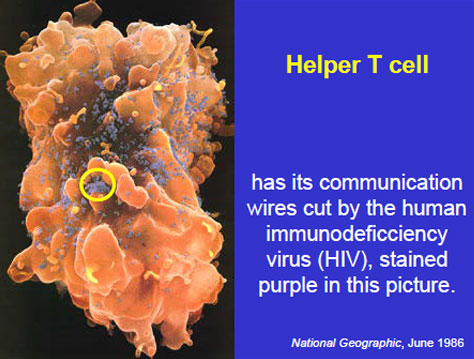
When a person is infected by the human immunodeficiency virus (HIV), the receptors of the T-lymphocytes are destroyed resulting in the loss of the ability to recognize foreign cells or substances. The person therefore loses his immune system and may die from any kind of infectious disease. This situation is called AIDS. So far, there has not been found any cure for AIDS.
Regulation of the Psycho-Neuro-Immune System
The cells of the immune system can be compared to the police or army of a nation. They swim peacefully along with all the other components of the blood to all corners of the organism. This is one of the reasons why it is so important to maintain a good circulation of the blood. But how do these cells know when and where they must enter in action? All metabolic mechanisms are quite complex and interact with each other. The regulation is done through feedback mechanisms and coordination of at least three other systems: the nervous system, the endocrine system, and our emotions. The communication is done by chemical substances called neurotransmitters. These either stimulate or depress the activity of the immune cells. Science is discovering progressively the interaction between the mind and the body. For this reason the immune system is today called the psycho-neuro-immune system.
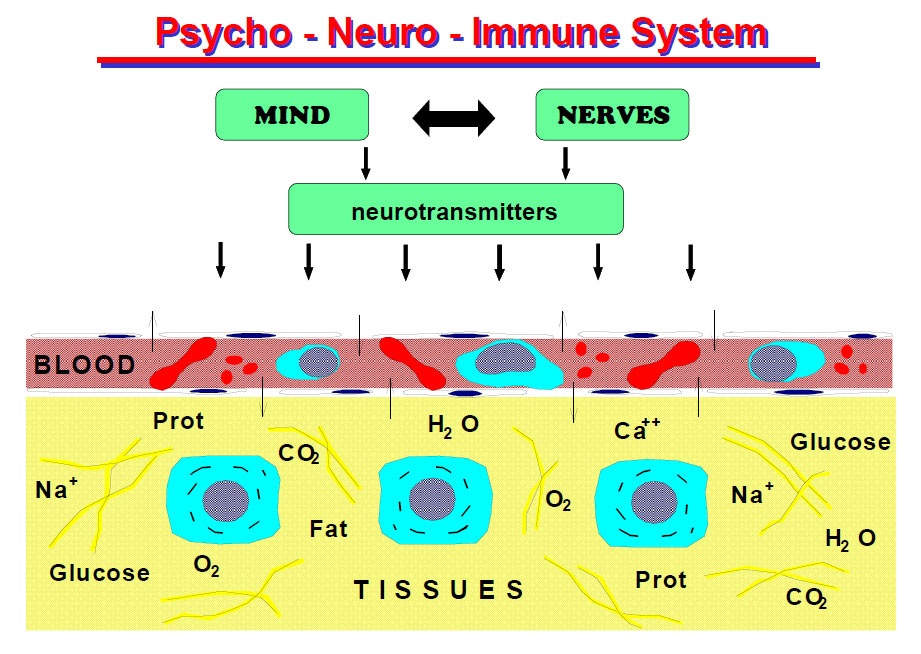
We could truly say that the immune system is a miracle. Science is just beginning to understand the marvelous mechanisms God made to preserve our health in best condition. It functions day and night without any noise. We can join the psalmist when he exclaims, “I praise you because I am fearfully and wonderfully made!” (Psalms 139:14)
Factors That Influence the Immune System
The mechanisms just mentioned operate at all times. The blood is involved with normal construction and remodeling activities during growth, with all adaptation mechanisms and stress management, as well as fighting diseases of all and every kind. Since all maintenance functions in health and disease depend on the optimal performance of the immune system, the logic question is, “what strengthens the immune system and what depresses it?” Life and death depend on it.
Some years ago there was an international congress at Loma Linda, California, on the Psycho-Neuro-Immune System. They came to the following conclusions:
Influences Upon the Immune System
| Strengthen | Depress |
|---|---|
|
|
The factors mentioned in this table remind us of the “natural remedies” represented in the NEWSTART® program. Let us briefly review each one of them.
Respiration
“In order to have good blood, we must breathe well. Full, deep inspirations of pure air, which fill the lungs with oxygen, purify the blood. They impart to it a bright color and send it, a life-giving current, to every part of the body. A good respiration soothes the nerves; it stimulates the appetite and renders digestion more perfect; and it induces sound, refreshing sleep.
“The lungs should be allowed the greatest freedom possible. Their capacity is developed by free action; it diminishes if they are cramped and compressed. Hence the ill effects of the practice so common, especially in sedentary pursuits, of stooping at one’s work. In this position it is impossible to breathe deeply. Superficial breathing soon becomes a habit, and the lungs lose their power to expand. A similar effect is produced by tight lacing. Sufficient room is not given to the lower part of the chest; the abdominal muscles, which were designed to aid in breathing, do not have full play, and the lungs are restricted in their action.
“Thus an insufficient supply of oxygen is received. The blood moves sluggishly. The waste, poisonous matter, which should be thrown off in the exhalations from the lungs, is retained, and the blood becomes impure. Not only the lungs, but the stomach, liver, and brain are affected. The skin becomes sallow, digestion is retarded; the heart is depressed; the brain is clouded; the thoughts are confused; gloom settles upon the spirits; the whole system becomes depressed and inactive, and peculiarly susceptible to disease.
“The lungs are constantly throwing off impurities, and they need to be constantly supplied with fresh air. Impure air does not afford the necessary supply of oxygen, and the blood passes to the brain and other organs without being vitalized. Hence the necessity of thorough ventilation. To live in close, ill-ventilated rooms, where the air is dead and vitiated weakens the entire system. It becomes peculiarly sensitive to the influence of cold, and a slight exposure induces disease. It is close confinement indoors that makes many women pale and feeble. They breathe the same air over and over until it becomes laden with poisonous matter thrown off through the lungs and pores, and impurities are thus conveyed back to the blood.” (Ministry of Healing, p. 272-274)
Exercise
What is the benefit of having good blood if it does not circulate properly to nourish all parts of the organism? An adult has about 5 liters of blood. This amount is not equally distributed throughout the body. The small arteries (arterioles) have muscular walls that regulate the blood flow to the respective organs. Active organs receive more blood, according to their needs, and resting organs receive less. It is an economical system. It is therefore important to activate all different parts of the body regularly in order to provide them with fresh blood and to take away the waste products. Regular exercise and fresh air are both important to maintain good health.
“The chief if not the only reason why many become invalids is that the blood does not circulate freely, and the changes in the vital fluid, which are necessary to life and health, do not take place. They have not given their bodies exercise nor their lungs food, which is pure, fresh air; therefore it is impossible for the blood to be vitalized, and it pursues its course sluggishly through the system. The more we exercise, the better will be the circulation of the blood.
“More people die for want of exercise than through overfatigue; very many more rust out than wear out. Those who accustom themselves to proper exercise in the open air, will generally have a good and vigorous circulation. We are more dependent upon the air we breathe than upon the food we eat. Men and women, young and old, who desire health, and who would enjoy active life should remember that they cannot have these without a good circulation. Whatever their business and inclinations, they should make up their minds to exercise in the open air as much as they can. They should feel it a religious duty to overcome the conditions of health which have kept them confined indoors, deprived of exercise in the open air.” (Counsels on Health, p. 173)
In the leading medical journal of the USA we read: “There is no drug in current or prospective use that holds as much promise for sustained health as a lifetime program of physical exercise.” (Bortz: Journal of American Medical Association: 1982:248, 1203)
Benefits of Exercise
Exercise of the long muscles of the arms and legs produces endorphins. Happy and positive thoughts and feelings release endorphins in the brain. Endorphins are also generated in the lungs and bowl. Endorphins strengthen the immune system and produce a feeling of well-being. Here is a summary list of the benefits of exercise:
- Improves body appearance and increases strength
- Strengthens the heart muscle
- Improves the circulation
- Increases mineral content of bones
- Reduces blood pressure
- Helps reduce weight in obese persons
- Increases HDL-cholesterol in blood
- Improves blood sugar control in diabetes
- Helps stress control
- Strengthens immune system
- Produces feeling of wellbeing
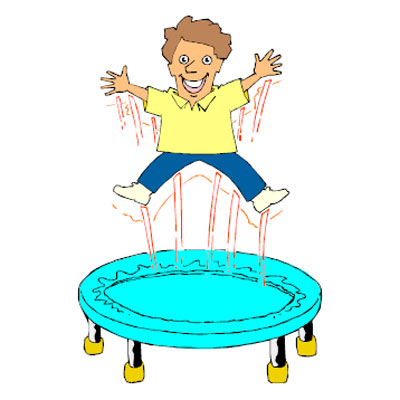
Notice that either excess or lack of exercise is detrimental to the immune system. For health benefits a moderate exercise is best. The pulse rate should be accelerated but the person should not run “out of breath”. The minimum duration for health benefits should be at least half an hour per day. This does not have to be all at once. An intermittent exercise has similar effects when accumulated. Especially not physically trained people should make short pauses in between to relax. The intensity of exercise can be adapted to every person’s needs. If there is a cardiac problem or any doubt consult your physician first. An important principle is to practice physical activity regularly, every day, if possible, because the physiological effects last only for 12 or 24 hours, depending on the intensity of the exercise.
It is not possible to say absolutely, which kind of activity is best. It is important to use as many as possible of the joints and muscles in order to maintain overall flexibility and to promote circulation to all organs. The chosen activity should be joyful, safe, useful and inexpensive. Walking in the fresh air or working in the garden are excellent and can be recommended to everyone.
“Walking, in all cases where it is possible, is the best remedy for diseased bodies…. There is no exercise that can take the place of walking. By it the circulation is greatly improved.” (Counsels on Health, p. 200)
“Exercise in the open air should be prescribed as a lifegiving necessity. And for such exercise there is nothing better than the cultivation of the soil. Let patients have flower beds to care for, or work to do in the orchard or vegetable garden. As they are encouraged to leave their rooms and spend time in the open air, cultivating flowers or doing some other light, pleasant work, their attention will be diverted from themselves and their sufferings.” (Ministry of Healing, p. 265)
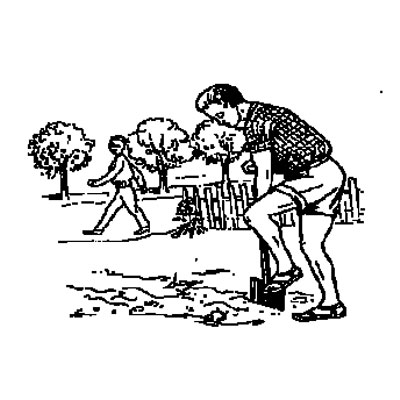
Rest
All functions in our body need a regular alternation of activity and rest. It is during the sleep hours that our body restores its spent energies. As we have seen in the study on longevity, lack of sleep is a major stressor, affecting both physical and mental health. An adult person needs an average of 7-8 hours of sleep daily. For elderly people 5 to 6 hours may be sufficient. It is important to have the sleep hours regularly. Workers in factories or hospitals with frequent changing shift hours have hard time to adjust their internal clock (circadian cycles). We know, for example, that in children and adolescents the growth hormone is released mainly during the hours before midnight.

Of course, the quality of sleep is also important. Here are some inspired counsels to improve the quality of sleep:
“I know from the testimonies given me from time to time for brain workers, that sleep is worth far more before than after midnight. Two hours’ good sleep before twelve o’clock is worth more than four hours after twelve o’clock.” (Manuscript Releases, vol. 7, p. 224)
“Another pernicious habit is that of eating just before bedtime. The regular meals may have been taken; but because there is a sense of faintness, more food is taken. By indulgence this wrong practice becomes a habit and often so firmly fixed that it is thought impossible to sleep without food. As a result of eating late suppers, the digestive process is continued through the sleeping hours. But though the stomach works constantly, its work is not properly accomplished. The sleep is often disturbed with unpleasant dreams, and in the morning the person awakes unrefreshed and with little relish for breakfast. When we lie down to rest, the stomach should have its work all done, that it, as well as the other organs of the body, may enjoy rest. For persons of sedentary habits late suppers are particularly harmful. With them the disturbance created is often the beginning of disease that ends in death.” (Ministry of Healing, p. 303; Child Guidance, p. 389)
“In most cases two meals a day are preferable to three. Supper, when taken at an early hour, interferes with the digestion of the previous meal. When taken later, it is not itself digested before bedtime. Thus the stomach fails of securing proper rest. The sleep is disturbed, the brain and nerves are wearied, the appetite for breakfast is impaired, the whole system is unrefreshed and is unready for the day’s duties.” (Education, p. 205)
Nutrition
The blood needs nutrients. As mentioned in the beginning, a “balanced nutrition” is necessary for the proper functioning of the immune system. Some people believe that a balanced diet means to eat something from everything. This is definitely not the case. In the next chapter we will see more details about a healthy diet based on the recommendations of the World Health Organization. Here are only a few basic thoughts to begin.
God revealed to Ellen G. White that “The grains, with fruits, nuts, and vegetables, contain all the nutritive properties necessary to make good blood. These elements are not so well or so fully supplied by a flesh diet.” (Ministry of Healing, p. 316)
Above statement is supported by experts of the World Health Organization who confirmed that “The nutrient goals indicate that the health needs of the population are best met by a high-carbohydrate, low-fat diet, rich in starchy foods (e.g., cereals, tubers, and pulses) and including a substantial intake of vegetables and fruit.” (Diet, Nutrition and the Prevention of Chronic Diseases, WHO, p. 158)
“A substantial amount of epidemiological and clinical data indicates that a high intake of plant foods and complex carbohydrates is associated with a reduced risk of several chronic diseases, especially coronary heart disease, certain cancers, hypertension, and diabetes.” (Diet, Nutrition and the Prevention of Chronic Diseases, WHO, p. 99)
On the negative side we saw before that “too much fat, especially cholesterol” depresses the immune system. Such diet is typically based on animal products like meat, fish, fowl, eggs, butter, milk and cheese. Dr. Colin T. Campbell, Professor Emeritus of Nutritional Biochemistry at Cornell University, speaking about autoimmune diseases, states that “of those diseases studied in relation to nutrition, the consumption of animal-based foods – especially cow’s milk – is associated with greater disease risk.” (The China Study, 2004, p. 199)
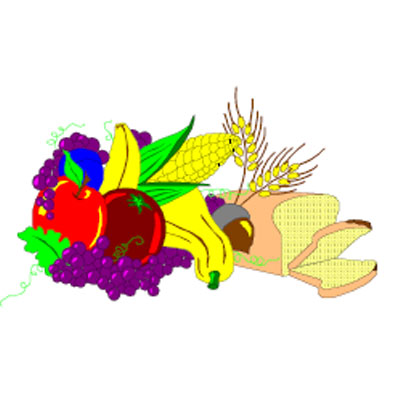
Also on the negative side is the lack of minerals like iron, copper, cobalt, zinc, selenium, magnesium and vitamin E. We must be careful, however, not to consider these elements as wonder drugs that boost the immune system, as the media often advertise to promote the use of supplements.
Alcohol
The pharmacological effect of alcohol is a depression of the nervous system under all circumstances. It is not used as a general anesthetic because of the very small margin between the pharmacological action and toxicity.
The WHO has identified alcohol drinking as one of the top-10 risks for global burden of disease. (WHO Press release, 28 March 2007, www.iarc.fr/en/media-centre/pr/2007/pr175.html) It is of no surprise that the Bible has many warnings against its use. “Do not gaze at wine when it is red, when it sparkles in the cup, when it goes down smoothly! In the end it bites like a snake and poisons like a viper.” (Proverbs 23: 31, 32) “Wine is a mocker and beer a brawler; whoever is led astray by them is not wise.” (Proverbs 20: 1)
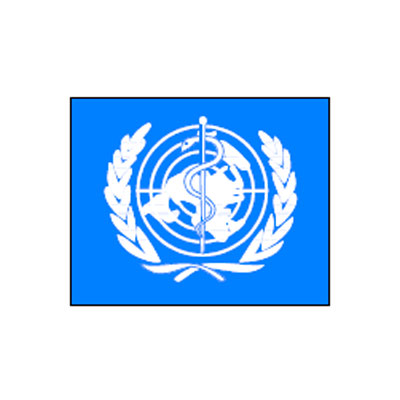
Regarding its effects upon the immune system “Alcohol should be considered as an immunosuppressive drug with far-reaching effects.” (MacGregor, RR, “Alcohol and Immuno Defense”, JAMA, Set 19, 1986, vol. 256, no. 11) There could be no stronger statement to express its negative effects on health, besides many other well-known disadvantages. Concerning the debate about its possible benefits for the heart, the World Health Organization finally came to the following conclusion: “Although regular low to moderate consumption of alcohol is protective against coronary heart disease, other cardiovascular and health risks associated with alcohol do not favour a general recommendation for its use.” (Diet, Nutrition and the Prevention of Chronic Diseases, WHO, 2003, p. 90)
Sunshine
Although everybody knows that life depends on sunshine, very little is being said about the application of sunshine as a treatment. More often we hear about the danger of sunburns and the possible promotion of skin cancers in white people. Here, as in everything else, it is important to find the right amount, not too less and not too much. Another basic principle in health and disease is that health (or disease) depends in general on several factors and complex mechanisms that are all interrelated. One of those mechanisms is related to
the production of melatonin by the pineal gland.
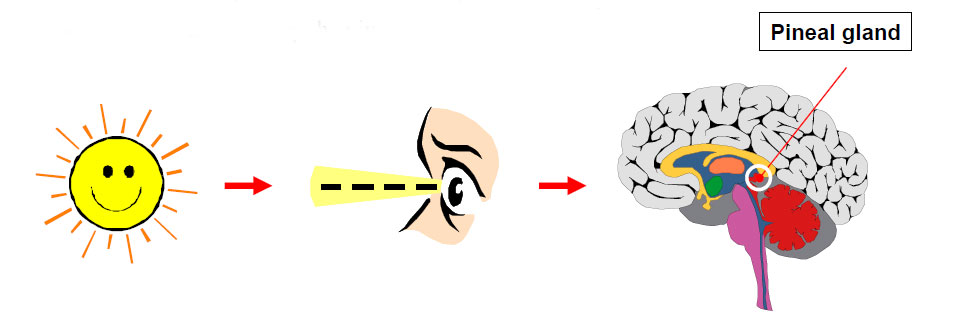
Melatonin has several important functions in the human body:
- Regulates circadian rhythm
- Antioxidant
- Against fatigue
- Improves sleep efficiency
- Helps recover from stress
- Stimulates immune system
- Lowers cholesterol (Proof Positive, p. 193-207)
Another important role of sunshine is the production of vitamin D in the skin and its ulterior transformation into active 1,25 D in the kidneys. Lack of sunshine is an important factor in the incidence of several autoimmune diseases. In the northern hemisphere, communities that are farther north tend to have more type 1 diabetes, multiple sclerosis, rheumatoid arthritis, osteoporosis, breast cancer, prostate cancer, colon cancer, vitiligo, in addition to other diseases. (T. C. Campbell, The China Study, 2004, p. 362-368)
A simple rule is to avoid baking your skin in the noon hours from 10 am to 3 or 4 pm and to start with only 10-15 minutes. There are great variations in skin sensitivity and individual care must be taken.
Here are some valuable instructions from Ellen G. White:
“Invalids too often deprive themselves of sunlight. This is one of nature’s most healing agents. It is a very simple, therefore not a fashionable remedy, to enjoy the rays of God’s sunlight and beautify our homes with its presence. Fashion takes the greatest care to exclude the light of the sun from parlors and sleeping rooms by dropping curtains and closing shutters, as though its rays were ruinous to life and health. It is not God who has brought upon us the many woes to which mortals are heirs. Our own folly has led us to deprive ourselves of things that are precious, of blessings which God has provided and which, if properly used, are of inestimable value for the recovery of health. If you would have your homes sweet and inviting, make them bright with air and sunshine. Remove your heavy curtains, open the windows, throw back the blinds, and enjoy the rich sunlight, even if it be at the expense of the colors of your carpets. The precious sunlight may fade your carpets, but it will give a healthful color to the cheeks of your children. If you have God’s presence and possess earnest, loving hearts, a humble home-made bright with air and sunlight, and cheerful with the welcome of unselfish hospitality, will be to your family, and to the weary traveler, a heaven below.” (Testimonies vol. 2, p. 527)
“Those who have the aged to provide for should remember that these especially need warm, comfortable rooms. Vigor declines as years advance, leaving less vitality with which to resist unhealthful influences; hence the greater necessity for the aged to have plenty of sunlight, and fresh, pure air.” (Ministry of Healing, p. 275)
Mental Factors
Positive emotions and feelings promote the health and provide strength, endurance, well- being and productivity. Negative feelings, on the other hand, promote diseases like asthma, peptic ulcers, hypertension, cancer, migraine, and heart attacks. Such are known as psychosomatic diseases. It is well known that mourning and sorrow weaken the immune system and make people more susceptible to infectious diseases and cancer. Psychosomatic medicine developed in the seventies. However, Ellen G. White wrote over hundred years ago something that scientists in her days did not even suspect:
“The condition of the mind affects the health to a far greater degree than many realize. Grief, anxiety, discontent, remorse, guilt, distrust, all tend to break down the life forces. Disease is sometimes produced, and is often greatly aggravated, by the imagination. Courage, hope, faith, sympathy, love, promote health and prolong life.” (Ministry of Healing, p. 241)
Also, since about 20 years ago there are an increasing number of scientific articles and studies showing that faith in God and active religiosity improve health and prolong life. The social support proper of religious communities, singing and praising God in worship, intercessory prayer, forgiveness, and other factors relating to a healthy lifestyle, all strengthen the immune system.
The American Association of Family Physicians made the following statement in January 2001: “Over the past several years, it has been suggested that spirituality is another important, yet often neglected, factor in the health of patients.” (www.aafp.org/afp/20010101/81.html) They also suggest that a spiritual assessment be included in the regular medical practice.
Long ago, the German priest and one of the founders of the Naturopathic medicine movement, Sebastian Kneipp (1821-1897) confessed that “only when I began to bring order into the souls of my patients, I was successful.” Although most commonly associated with “cold water treatment”, Kneipp was the proponent of an integral system of healing, which rested on five main tenets: hydrotherapy, herbalism, exercise, nutrition, and spirituality.
Ellen G. White, who lived at the same time, declared in 1872 that “The religion of the Bible is not detrimental to the health of the body or of the mind. The influence of the Spirit of God is the very best medicine that can be received by a sick man or woman.” (Medical Ministry, p. 12)
NEWSTART
Putting now all facts together, we can see that the NEWSTART® program fits perfectly into the psycho-neuro-immune system. The NEWSTART acronym was created by physicians and teachers of the Weimar Institute in California (www.newstart.com) based on the eight natural factors of health mentioned by Ellen G. White: “Pure air, sunlight, abstemiousness, rest, exercise, proper diet, the use of water, trust in divine power – these are the true remedies. Every person should have a knowledge of nature’s remedial agencies and how to apply them.” (Ministry of Healing, p. 127)
In summary we can emphasize the following points:
- Life is governed by natural laws. Disobedience to these results in disease.
- The natural laws together with the moral laws – all made by God – have the purpose to keep man completely healthy, happy and holy.
- The physiological mechanisms that regulate life processes are represented by the psycho-neuro-immune system. That means that the mind, the soul and the body act together and influence each other.
- The blood is the central vehicle for water, nutrients, hormones and immune cells. Health depends on the correct composition and circulation of the blood.
- Long sustained disturbances in the composition and/or circulation of the blood lead to chronic (lifestyle) diseases, in contrast to acute diseases (accidents, infections, poisonings, etc.)
- The organism has many ways to compensate deficiencies and incorrections. Chronic diseases are therefore usually the result of more than one factor. The more risk factors come together, the higher the likelihood to get sick.
- Most genetic predispositions require the presence of an additional lifestyle factor to be expressed, according to the aphorism, “genetics charge the bullet – lifestyle pulls the trigger”.
- The NEWSTART® program encompasses all main lifestyle factors and is scientifically sound.
- The two factors where most mistakes are made and where corrections show best results are exercise and nutrition. Together with alcoholism and cigarette smoking they are responsible for most suffering on this world.
- The ultimate author of health is not nature itself nor inherent life forces, but God, the Creator. “If you listen carefully to the voice of the LORD your God and do what is right in his eyes, if you pay attention to his commands and keep all his decrees, I will not bring on you any of the diseases I brought on the Egyptians, for I am the LORD, who heals you.” (Exodus 15:26)
- Eternal life is possible only through Jesus Christ. “For God so loved the world that he gave his only Son, that whoever believes in him should not perish but have eternal life.” (John 3:16 RSV)
